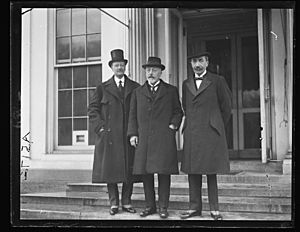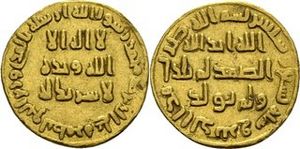Henri Pirenne facts for kids
Quick facts for kids
Henri Pirenne
|
|
|---|---|
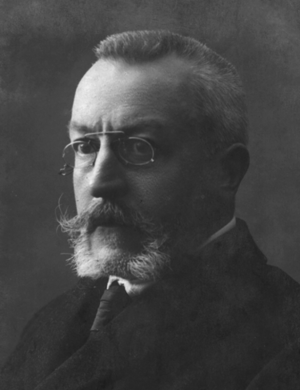
Portrait of Pirenne, c. 1910
|
|
| Born | 23 December 1862 Verviers, Belgium |
| Died | 25 October 1935 (aged 72) Uccle, Belgium |
| Occupation | Historian and political activist |
| Alma mater | University of Liège |
| Genre | Medieval history, economic history, Belgian history |
| Notable works | Medieval Cities: Their Origins and the Revival of Trade (1927) Mohammed and Charlemagne (1937) |
| Notable awards | Francqui Prize (1933) |
| Spouse | Jenny Vanderhaeghen |
| Children | Henri Pirenne (1888–1935), Jacques Pirenne (1891–1972), Pierre Pirenne (1895–1914), Robert Pirenne (1900–1931), Jacqueline Pirenne (Granddaughter, 1918–1990) |
Henri Pirenne (born December 23, 1862 – died October 24, 1935) was a famous Belgian historian. He was an expert on the Middle Ages, especially the history of Wallonia. He wrote many books about Belgium's history in French.
Pirenne was also a well-known public figure. He made important contributions to understanding how cities developed. He also had a new idea about when the Roman Empire truly ended. During World War I, he bravely resisted the German occupation of Belgium.
Today, Henri Pirenne is remembered for three main ideas in European history:
- The Pirenne Thesis: This idea explains how the Middle Ages began. It looks at changes in trade and how new states formed.
- His unique view of Belgium's medieval history.
- His ideas about how medieval cities grew and developed.
Pirenne believed that big changes in society, economy, culture, and religion happened over a long time. These changes were caused by deep, underlying reasons. His ideas influenced other famous historians, like Marc Bloch. Many historians still use Pirenne's main ideas as a starting point, even if they change them a bit.
Contents
About Henri Pirenne
Early Life and Career
Henri Pirenne was born in Verviers, an industrial city in Liège Province, Belgium. He studied history at the University of Liège. One of his teachers was Godefroid Kurth.
In 1886, Pirenne became a history professor at the University of Ghent. He taught there until 1930. After World War I, he was one of the most important historians in Belgium. He received many awards and was asked to join many important committees. From 1918 to 1921, he was the head of the University of Ghent.
Pirenne was good friends with German historian Karl Lamprecht. However, their friendship ended during World War I. Lamprecht tried to get Belgians to work with Germany's war goals, which Pirenne strongly opposed.
Life During Wartime
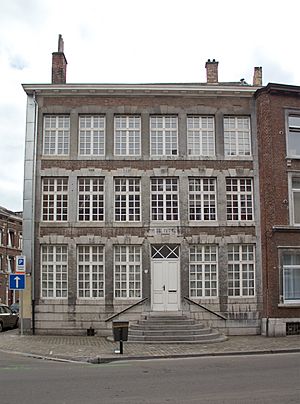
In 1914, the German Empire invaded Belgium. The country was then under German military rule. Pirenne was involved in the Belgian resistance during World War I.
On March 18, 1916, German soldiers questioned and arrested Pirenne. They had ordered professors at the University of Ghent to keep teaching, but Pirenne refused. His son, Pierre, had been killed in battle in October 1914. A German officer asked Pirenne why he spoke only French, even though he knew German well. Pirenne replied, "I have forgotten German since August 3, 1914." This was the day Germany invaded Belgium.
Pirenne was held in several prison camps, including Krefeld, Holzminden, and Jena. He was not allowed to have books. However, he learned Russian from captured soldiers from the Eastern Front. He then read Russian history books that were given to him. This experience gave his later work a unique perspective.
While imprisoned in Jena, he began writing his history of medieval Europe. He wrote it entirely from memory. Instead of just listing wars and kings, his book, A History of Europe, looked at big social, political, and trade trends. It is amazing for its historical insights and its fairness, especially since he wrote it while imprisoned.
After the War
After the war, Pirenne felt disappointed with German culture. However, he still believed that German scholarly works were important. He criticized ideas like race theory and nationalism as reasons for Germany's wartime actions.
His earlier belief that humanity would always progress changed. He began to accept that chance events and important individuals could also shape history.
Henri Pirenne stopped working on A History of Europe in the middle of the 16th century. He returned home and continued his life. He died in Uccle, Brussels, in 1935. His son, Jacques Pirenne, who also became a historian, found the unfinished manuscript. Jacques edited the work and published it. The English version came out in 1956. It is seen as a huge intellectual achievement.
Pirenne's Main Ideas
How European Towns Grew
Pirenne first shared his ideas about how European towns formed in articles from 1895. He developed his famous Pirenne Thesis while he was a prisoner in Germany during World War I. He published it in papers between 1922 and 1923. He spent the rest of his life adding more evidence to support his idea. His most famous books on this topic are Medieval Cities: Their Origins and the Revival of Trade (1927) and Mohammed and Charlemagne (1937).
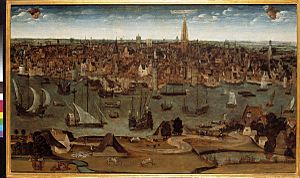
The Pirenne Thesis is an early example of economic history. It looks at how money and trade shaped the past. Pirenne noticed that in the 800s, long-distance trade was very low. The only places that were not just farms were religious, military, or government centers. These places served the feudal ruling classes as forts, church centers, monasteries, or royal homes.
When trade started to grow again in the late 900s and 1000s, merchants and craftspeople moved to these existing centers. They formed new neighborhoods, called suburbs, where trade and manufacturing happened. These "new men" were outside the old feudal system. They lived on the edges of the established order. The old feudal system stayed mostly the same.
Eventually, the growing merchant class became strong enough to break free from feudal rules. Or they could buy special rights from the old leaders. Pirenne showed how different the new merchant class was from the old system. The leaders among the merchants became a wealthy group called a patriciate. They gained both economic and political power.
Pirenne believed that the feudal nobles and the city merchants had different interests. This led to conflicts in the 1200s and 1300s. Some historians have challenged this idea, saying their interests were not always so different.
Traditionally, historians said the Middle Ages began when the Western Roman Empire fell in the 400s. Pirenne, however, argued that classical civilization did not truly end until the 700s. He disagreed that Germanic tribes caused the Roman Empire to collapse. He also said that the end of the Roman Empire was not just about the last Roman emperor in 476 AD.
Pirenne pointed out that the economy around the Mediterranean Sea stayed mostly the same even after the barbarian invasions. The Roman way of life did not change much right after Rome "fell." The Goths came to Rome not to destroy it, but to enjoy its benefits. They tried to keep the Roman way of life going. More recent historians now talk about "Late Antiquity." This period shows how the ancient and medieval worlds slowly changed, with a lot of cultural continuity.
Islam and the Early Middle Ages
Pirenne believed that the real break in Roman history happened in the 700s. This was due to the Arab expansion. The Islamic conquest of areas like southern Turkey, Syria, Palestine, North Africa, Spain, and Portugal cut off trade links to western Europe. This made western Europe a quiet, poor area. Wealth flowed out as raw materials, and nothing came back.
This led to a steady decline and poverty. By the time of Charlemagne, western Europe was mostly farming-based, with little long-distance trade. People grew just enough to survive.
Pirenne famously said, "Without Islam, the Frankish Empire would probably never have existed, and Charlemagne, without Muhammad, would be inconceivable." He meant that the barbarian invasions in the 300s and 400s did not cause the Roman Empire to collapse. Instead, the Muslim control of North Africa made the Mediterranean a barrier. This cut off western Europe from the East. This allowed the Carolingian rulers, especially Charlemagne, to create a new, distinctly western form of government.
Pirenne used facts about money to support his idea. He noted that many items that had to come from outside western Europe disappeared. For example, gold coins were no longer made north of the Alps after the 600s. This showed a loss of access to wealthier parts of the world. Also, papyrus, which was only made in Egypt, stopped appearing in northern Europe after the 600s. People went back to using parchment for writing. This showed Europe's economic isolation.
When Pirenne's thesis was first published, most historians did not agree with it. However, it sparked a lot of discussion about the Early Middle Ages. It also showed how historians could divide history into different periods. His ideas continue to be discussed today. Recent discoveries from archaeology are still debated to see if they support or challenge his thesis.
Belgian History
Pirenne's other major idea was about the history of medieval Belgium. Belgium became an independent country in 1830, just before Pirenne was born. Throughout history, its fate was linked to the Low Countries, which now include the Netherlands, Luxembourg, and parts of northern France. Also, Belgium is divided by two main languages: French and Dutch.
The idea that Belgium was a unified country might seem like a coincidence. Pirenne wanted to prove otherwise in his History of Belgium (1899–1932). He traced Belgium's history back to the Roman period. His ideas, which supported a form of Belgian nationalism, have also caused debate.
Pirenne's Histoire de Belgique was published in seven books. He wrote it between 1899 and 1932. He emphasized how old traditions and economic forces brought the Flemish and Walloons together. Pirenne believed in a unified "Belgian civilization." He thought this society, politics, and ethnic identity existed for centuries before Belgium became independent in 1830.
Pirenne was a liberal, but his history was so balanced that people from different groups in Belgium could use it. Catholics, liberals, and socialists all quoted from it in their publications and political meetings. His work was also new for its time because it avoided the idea of a racially defined "national spirit." Instead, he argued that Belgium naturally grew as a diverse society. It served as a link between Latin and Germanic Europe.
Pirenne's history made him one of Belgium's leading public thinkers during his lifetime. His ideas are still important for understanding Belgium's past. However, his idea of a continuous Belgian civilization forming the basis of political unity is less popular now. Some Belgian scholars argue that their country's creation was more of a historical accident. Pirenne's argument that long Spanish rule in the Low Countries had little cultural impact has also been challenged by new research since 1970.
Henri Pirenne gave most of his personal library to the Academia Belgica in Rome. In 1933, the seventh volume of his history won the Francqui Prize for Human Sciences.
Important Books
Medieval Cities
Pirenne wrote Medieval Cities: Their Origins and the Revival of Trade (1927). This book was based on talks he gave in the United States in 1922. In it, he argues that from the 900s to the 1100s, Europe took back control of the Mediterranean Sea from the Muslim world. This opened up sea routes to the East.
This allowed a merchant or middle class to form. It also led to the growth of cities, which were the typical homes for this class. Pirenne believed that capitalism and democracy both started in Europe's cities. His "Merchant Enterprise School" had some ideas similar to those of Karl Marx about the merchant class. Pirenne's idea of a trade boom in towns during the 1000s is still the accepted view today.
A History of Europe
Pirenne wrote a two-volume book called A History of Europe: From the End of the Roman World in the West to the Beginnings of the Western States. This was an amazing but unfinished work. Pirenne wrote it while he was imprisoned in Germany during World War I. His son published it in 1936. The English translation was first published in Great Britain in 1939.
See also
 In Spanish: Henri Pirenne para niños
In Spanish: Henri Pirenne para niños
- Paul Fredericq – a historian often seen as the Flemish equivalent of Pirenne


